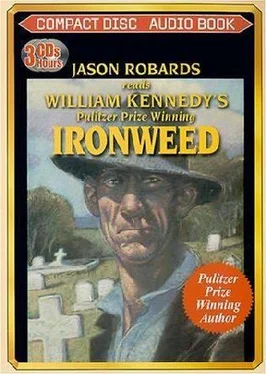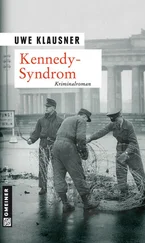William Kennedy - Ironweed
Здесь есть возможность читать онлайн «William Kennedy - Ironweed» весь текст электронной книги совершенно бесплатно (целиком полную версию без сокращений). В некоторых случаях можно слушать аудио, скачать через торрент в формате fb2 и присутствует краткое содержание. Жанр: Современная проза, на английском языке. Описание произведения, (предисловие) а так же отзывы посетителей доступны на портале библиотеки ЛибКат.
- Название:Ironweed
- Автор:
- Жанр:
- Год:неизвестен
- ISBN:нет данных
- Рейтинг книги:3 / 5. Голосов: 1
-
Избранное:Добавить в избранное
- Отзывы:
-
Ваша оценка:
- 60
- 1
- 2
- 3
- 4
- 5
Ironweed: краткое содержание, описание и аннотация
Предлагаем к чтению аннотацию, описание, краткое содержание или предисловие (зависит от того, что написал сам автор книги «Ironweed»). Если вы не нашли необходимую информацию о книге — напишите в комментариях, мы постараемся отыскать её.
Ironweed — читать онлайн бесплатно полную книгу (весь текст) целиком
Ниже представлен текст книги, разбитый по страницам. Система сохранения места последней прочитанной страницы, позволяет с удобством читать онлайн бесплатно книгу «Ironweed», без необходимости каждый раз заново искать на чём Вы остановились. Поставьте закладку, и сможете в любой момент перейти на страницу, на которой закончили чтение.
Интервал:
Закладка:
Aldo Campione, walking on the opposite side of North Pearl from Francis and Helen, raised his right hand in the same ambiguous gesture Francis had witnessed at the bar. As Francis speculated on the meaning, the man who had been sitting with Aldo stepped out of the shadows into a streetlight’s glow, and Aldo’s gesture then became clear: it introduced Francis to Dick Doolan, the bum who tried to cut off Francis’s feet with a meat cleaver.
“I went to the kid’s grave today,” Francis said.
“What kid?”
“Gerald.”
“Oh, you did?” she said. “Then that was the first time, wasn’t it? It must’ve been.”
“Right.”
“You’re thinking about him these days. You mentioned him last week.”
“I never stop thinkin’ about him.”
“What’s gotten into you?”
Francis saw the street that lay before him: Pearl Street, the central vessel of this city, city once his, city lost. The commerce along with its walls jarred him: so much new, stores gone out of business he never even heard of. Some things remained: Whitney’s, Myers’, the old First Church, which rose over Clinton Square, the Pruyn Library. As he walked, the cobblestones turned to granite, houses became stores, life aged, died, renewed itself, and a vision of what had been and what might have been intersected in an eye that could not really remember one or interpret the other. What would you give never to have left, Francis?
“I said, what’s got into you?”
“Nothin’s got into me. I’m just thinkin’ about a bunch of stuff. This old street. I used to own this street, once upon a time.”
“You should’ve sold it when you had the chance.”
“Money. I ain’t talkin’ about money.”
“I didn’t think you were. That was a funny.”
“Wasn’t much funny. I said I saw Gerald’s grave. I talked to him.”
“Talked? How did you talk?”
“Stood and talked to the damn grass. Maybe I’m gettin’ nutsy as Rudy. He can’t hold his pants up. they fall over his shoes.”
“You’re not nutsy, Francis. It’s because you’re here. We shouldn’t be here. We should go someplace else.”
“Right. That’s where we oughta go. Else.”
“Don’t drink any more tonight.”
“Listen here. Don’t you nag my ass.”
“I want you straight, please. I want you straight.”
“I’m the straightest thing you’ll see all week. I am so straight. I’m the straightest thing you’ll sweek. The thing that happened on the other side of the street. The thing that happened was Billy told me stuff about Annie. I never told you that. Billy told me stuff about Annie, how she never told I dropped him.”
“Never told who, the police?”
“Never nobody. Never a damn soul. Not Billy, not Peg, not her brother, not her sisters. Ain’t that the somethin’est thing you ever heard? I can’t see a woman goin’ through that stuff and not tellin’ nobody about it.”
“You’ve got a lot to say about those people.”
“Not much to say.”
“Maybe you ought to go see them.”
“No, that wouldn’t do no good.”
“You’d get it out of your system.”
“What out of my system?”
“Whatever it is that’s in there.”
“Never mind about my system. How come you wouldn’t stay at the mission when you got an invite?”
“I don’t want their charity.”
“You ate their soup.”
“I did not. All I had was coffee. Anyway, I don’t like Chester. He doesn’t like Catholics.”
“Catholics don’t like Methodists. What the hell, that’s even. And I don’t see any Catholic missions down here. I ain’t had any Catholic soup lately.”
“I won’t do it and that’s that.”
“So freeze your ass someplace. Your flower’s froze already.”
“Let it freeze.”
“You sang a song at least.”
“Yes I did. I sang while Sandra was dying.”
“She’da died no matter. Her time was up.”
“No, I don’t believe that. That’s fatalism. I believe we die when we can’t stand it anymore. I believe we stand as much as we can and then we die when we can, and Sandra decided she could die.”
“I don’t fight that. Die when you can. That’s as good a sayin’ as there is.”
“I’m glad we agree on something,” Helen said.
“We get along all right. You ain’t a bad sort.”
“You’re all right too.”
“We’re both all right,” Francis said, “and we ain’t got a damn penny and noplace to flop. We on the bum. Let’s get the hell up to Jack’s before he puts the lights out on us.”
Helen slipped her arm inside Francis’s. Across the street Aldo Campione and Dick Doolan, who in the latter years of his life was known as Rowdy Dick, kept silent pace.
o o o
Helen pulled her arm away from Francis and tightened her collar around her neck, then hugged herself and buried her hands in her armpits.
“I’m chilled to my bones,” she said.
“It’s chilly, all right.”
“I mean a real chill, a deep chill.”
Francis put his arm around her and walked her up the steps of Jack’s house. It stood on the east side of Ten Broeck Street, a three-block street in Arbor Hill named for a Revolutionary War hero and noted in the 1870s and 1880s as the place where a dozen of the city’s arriviste lumber barons lived, all in a row, in competitive luxury. For their homes the barons built handsome brownstones, most of them now cut into apartments like Jack’s, or into furnished rooms.
The downstairs door to Jack’s opened without a key. Helen and Francis climbed the broad walnut staircase, still vaguely elegant despite the threadbare carpet, and Francis knocked. Jack opened the door and looked out with the expression of an ominous crustacean. With one hand he held the door ajar, with the other he gripped the jamb.
“Hey Jack,” Francis said, “we come to see ya. How’s chances for a bum gettin’ a drink?”
Jack opened the door wider to look beyond Francis and when he saw Helen he let his arm fall and backed into the apartment. Kate Smith came at them, piped out of a small phonograph through the speaker of the radio. The Carolina moon was shining on somebody waiting for Kate. Beside the phonograph sat Clara, balancing herself on a chamber pot, propped on all sides with purple throw pillows, giving her the look of being astride a great animal. A red bedspread covered her legs, but it had fallen away at one side, revealing the outside of her naked left thigh, visible to the buttocks. A bottle of white fluid sat on the table by the phonograph, and on a smaller table on her other side a swinging rack cradled a gallon of muscatel, tiltable for pouring. Helen walked over to Clara and stood by her.
“Golly it’s cold for this time of year, and they’re calling for snow. Just feel my hands.”
“This happens to be my home,” Clara said hoarsely, “and I ain’t about to feel your hands, or your head either. I don’t see any snow.”
“Have a drink,” Jack said to Francis.
“Sure,” Francis said. “I had a bowl of soup about six o’clock but it went right through me. I’m gonna have to eat somethin’ soon.”
“I don’t care whether you eat or not,” Jack said.
Jack went to the kitchen and Francis asked Clara: “You feelin’ better?”
“No.”
“She’s got the runs,” Helen said.
“I’ll tell people what I got,” Clara said.
“She lost her husband this week,” Jack said, returning with two empty tumblers. He tilted the jug and half-filled both.
“How’d you find out?” Helen said.
“I saw it in the paper today,” Clara said.
“I took her to the funeral this morning,” Jack said. “We got a cab and went to the funeral home. They didn’t even call her.”
Читать дальшеИнтервал:
Закладка:
Похожие книги на «Ironweed»
Представляем Вашему вниманию похожие книги на «Ironweed» списком для выбора. Мы отобрали схожую по названию и смыслу литературу в надежде предоставить читателям больше вариантов отыскать новые, интересные, ещё непрочитанные произведения.
Обсуждение, отзывы о книге «Ironweed» и просто собственные мнения читателей. Оставьте ваши комментарии, напишите, что Вы думаете о произведении, его смысле или главных героях. Укажите что конкретно понравилось, а что нет, и почему Вы так считаете.












